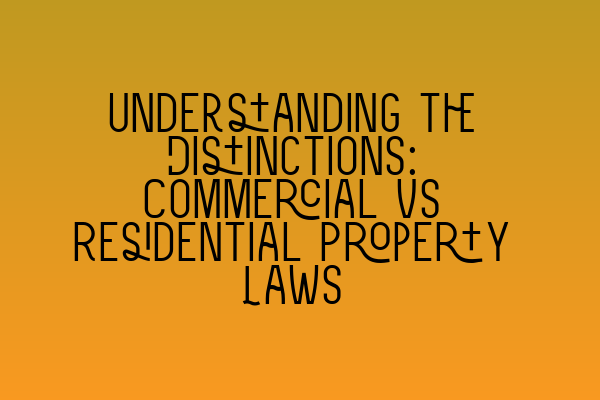Understanding the Distinctions: Commercial vs Residential Property Laws
Are you new to the world of property law? Do you find yourself confused when it comes to understanding the differences between commercial and residential property laws? Well, you’re not alone. The legal framework surrounding commercial and residential properties can be complex and overwhelming for newcomers. However, with the right guidance, you can gain a clear understanding of the distinctions between the two and navigate the legal landscape successfully.
In this blog post, we will delve into the intricacies of commercial and residential property laws, highlighting their key differences and helping you comprehend the regulations that govern them. Whether you are a property owner, investor, or simply someone with an interest in property law, reading on will empower you with valuable insights.
Before we dive into the specifics, it’s crucial to understand the fundamental contrast between commercial and residential properties. Commercial properties are real estate assets used for business purposes, such as office buildings, retail shops, warehouses, and restaurants. On the other hand, residential properties are properties used as living spaces, such as houses, apartments, condominiums, and townhouses.
Now that we have established the foundation, let’s explore the key distinctions between commercial and residential property laws:
Ownership and Use:
Commercial properties are typically owned by businesses or investors and are primarily used for generating income. The regulations surrounding commercial property law are designed to address the unique needs of businesses and ensure a fair and stable environment for commerce.
Residential properties, on the other hand, are usually owned by individuals or families for personal use or as an outlet for generating rental income. Residential property laws focus on protecting the rights and interests of tenants, as well as governing the purchase and sale of homes.
Leases and Tenancy:
Commercial leases tend to be more complex and lengthy compared to residential leases. Commercial tenants often have more flexibility to negotiate lease terms, such as rental rates, lease duration, and maintenance responsibilities. Additionally, there may be specific clauses addressing issues such as subletting, use restrictions, and indemnification.
Residential leases, on the other hand, are usually standardized contracts with less room for negotiation. Residential tenants have certain statutory protections, such as the right to habitable conditions, privacy, and security of tenure. Landlords must also follow specific procedures when terminating a residential tenancy.
Zoning and Planning:
Zoning laws play a crucial role in distinguishing between commercial and residential properties. Zoning regulations determine the approved uses for each property and help maintain a balance between residential and commercial areas. Commercial properties are typically located in designated commercial zones, ensuring compatibility with the surrounding environment.
Residential properties are concentrated in residential zones, providing neighborhoods with well-defined areas for living and recreation. Zoning restrictions help preserve the character and quality of residential areas and ensure a more harmonious living environment for residents.
Taxation and Financing:
Commercial properties are subject to different tax and financing rules compared to residential properties. Commercial property owners may be subject to additional taxes, such as business rates or sales tax, depending on the jurisdiction. Financing options for commercial properties may also differ, with lenders taking into account factors such as rental income potential, vacancy risk, and market conditions.
Residential properties, on the other hand, may qualify for tax deductions and exemptions, such as the homeowner’s principal residence exemption. Financing options for residential properties are typically more accessible and may offer lower interest rates since they are often viewed as less risky investments.
Conclusion:
Understanding the distinctions between commercial and residential property laws is crucial for anyone involved in the world of real estate. Whether you are a property owner, investor, or tenant, having a solid grasp of the legal framework governing these properties will help you make informed decisions and protect your interests.
While this blog post has provided you with an overview of the key differences between commercial and residential property laws, there is still much more to explore. If you are preparing for a career in property law or simply want to expand your knowledge further, we invite you to check out our related articles for valuable resources:
– SQE 1 Practice Exam Questions: Test your knowledge and familiarize yourself with the type of questions you may encounter in the SQE 1 exam.
– SQE 1 Practice Mocks FLK1 FLK2: Access practice mocks specifically tailored to help you prepare for the SQE 1 exam.
– SQE 2 Preparation Courses: Enhance your understanding of property law and other essential areas through our comprehensive SQE 2 preparation courses.
– SQE 1 Preparation Courses: Get a head start on your SQE 1 exam preparation by enrolling in our specialized courses designed to cover all relevant topics.
– SRA SQE Exam Dates: Stay updated with the latest examination dates and deadlines for the SRA SQE exams.
Remember, knowledge is power, and by familiarizing yourself with the nuances of commercial and residential property laws, you can confidently navigate the complex world of real estate transactions and ensure compliance with the legal requirements applicable to your specific circumstances.
